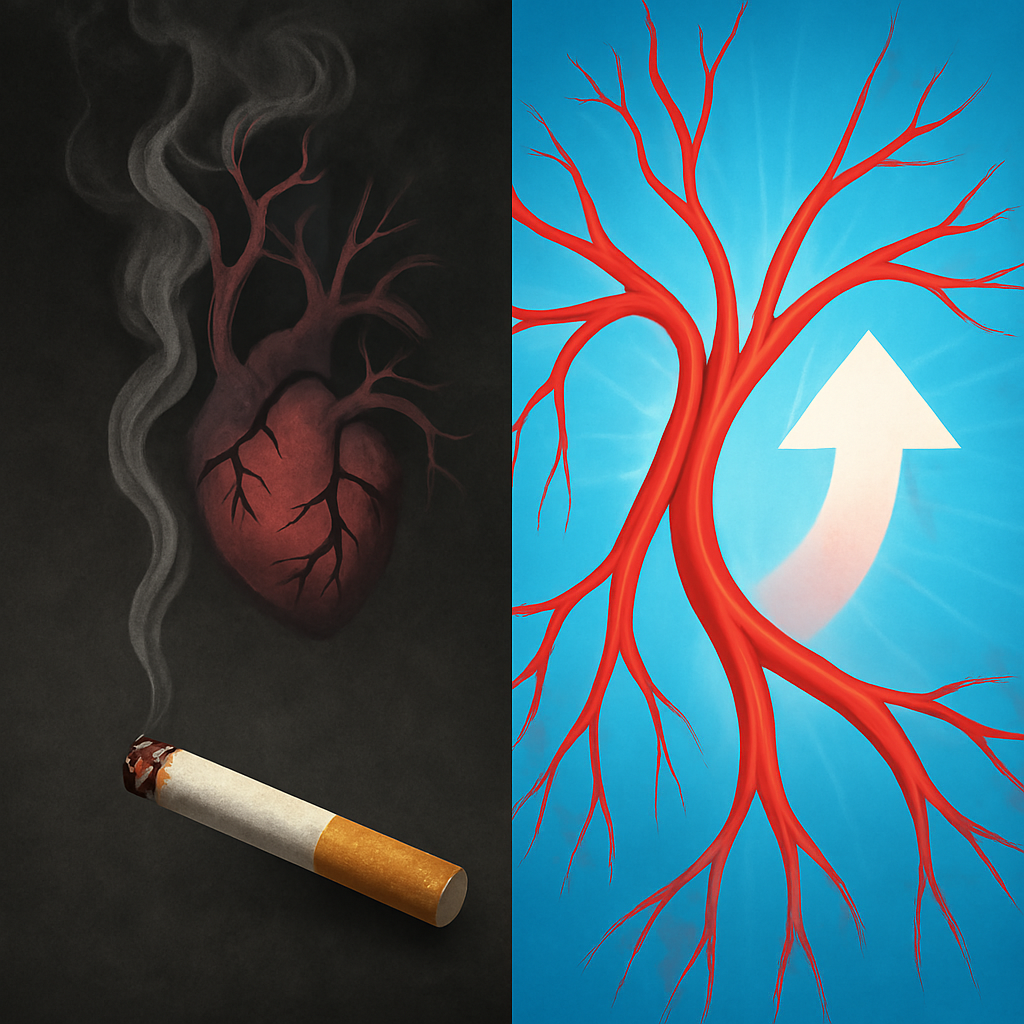A Habit That Hits Harder Than You Think
Smoking is widely known for its harmful effects on the lungs and heart, but many men don’t realize that it also directly impacts sexual health. In fact, smoking is a major — and often underestimated — cause of erectile dysfunction (ED). The connection is so strong that men who smoke are significantly more likely to experience ED than non-smokers. Fortunately, quitting smoking not only benefits overall health — it can also lead to noticeable improvements in sexual performance.
How Erections Work
To understand how smoking interferes with erections, it’s important to understand how erections happen. An erection relies on healthy blood flow, responsive nerves, and smooth muscle relaxation. When a man is aroused, blood flows into the spongy tissue of the penis, filling the chambers and creating firmness. Nitric oxide (a molecule produced by the body) plays a key role by relaxing the blood vessels and allowing this blood to flow freely. Smoking disrupts this delicate system at multiple levels.
How Smoking Causes Erectile Dysfunction
Cigarettes and other tobacco products contain thousands of chemicals, including nicotine, carbon monoxide, and tar. These substances damage the vascular system, inflame the lining of blood vessels, and impair nitric oxide production. As a result, smokers experience:
- Reduced blood flow to the penis
- Narrowed arteries (atherosclerosis)
- Poor circulation in the lower body
- Lower oxygen delivery to tissues
- Impaired nitric oxide release, which weakens the erection process
These effects create a direct and measurable decline in erectile function — and the more you smoke, the worse it gets.
Statistics That Speak Loudly
Studies show that:
- Smokers are up to 2 times more likely to suffer from ED than non-smokers
- Heavy smokers (20+ cigarettes per day) have even higher risk
- Men who quit smoking often see improvements in erections within a few months, especially if vascular damage has not yet become permanent
- In one study, 25% of men who quit smoking reported significant improvements in ED after just 6 months
The damage smoking does to sexual function is both preventable and, in many cases, reversible.
Smoking and Testosterone
While smoking doesn’t always cause a drop in testosterone, it can indirectly affect hormone balance by reducing oxygen levels, increasing oxidative stress, and impairing adrenal function. Smokers may also have a harder time building muscle or recovering from exercise — both important factors for maintaining healthy testosterone levels.
Smoking and Sexual Desire
Smoking doesn’t just affect erections — it also impacts libido. Chronic tobacco use reduces stamina, energy, and blood flow to the brain, which can lower arousal and interest in sex. Psychological effects, such as anxiety and low self-esteem linked to smoking, can further reduce sexual confidence and desire.
The Effects of Vaping on Erections
Many men have turned to vaping (e-cigarettes) as an alternative to smoking, believing it to be safer. While vaping may eliminate some harmful combustion by-products, it still exposes the body to nicotine and other chemicals that affect blood vessels. Early research suggests that vaping may still contribute to ED, especially when used frequently or in combination with traditional cigarettes. More long-term studies are needed, but caution is warranted.
Secondhand Smoke and Erectile Health
Even if you don’t smoke, regular exposure to secondhand smoke can impair blood vessel function and increase ED risk. If your partner or people in your household smoke around you, your sexual health may still be affected. Creating a smoke-free environment benefits everyone — not just the smoker.
How Quickly Does Function Improve After Quitting?
Recovery depends on your age, the number of years you’ve smoked, and the current health of your cardiovascular system. In general:
- Within 2 to 12 weeks of quitting, blood circulation begins to improve
- Within 3 to 6 months, many men report firmer, more reliable erections
- After 1 year, ED risk decreases significantly compared to current smokers
The earlier you quit, the greater your chances of full recovery — but it’s never too late to benefit.
Tips for Quitting Smoking
Set a Quit Date
Pick a day in the next week or two to stop smoking. Mark it on your calendar and commit.
Understand Your Triggers
Know what situations, emotions, or routines lead you to smoke. Replace those habits with healthier ones — like walking, chewing gum, or drinking water.
Use Support Tools
Consider nicotine replacement therapy (patches, gum, lozenges) or medications prescribed by a doctor. These can reduce withdrawal symptoms and make quitting easier.
Get Social Support
Tell friends, family, or a partner that you’re quitting. Their encouragement can help you stay accountable.
Stay Busy and Active
Exercise improves blood flow, reduces stress, and helps manage cravings. Physical activity is one of the best tools for both quitting smoking and improving erectile health.
Don’t Fear Relapses
Slips happen. Don’t give up — learn from it and try again. Most people make several attempts before quitting for good.
Quitting Is the Ultimate Sexual Performance Booster
While many products promise to enhance sexual performance, few are as powerful as quitting smoking. It’s a decision that improves blood flow, increases stamina, boosts confidence, and supports stronger, more consistent erections. It also enhances your overall health, energy, and life expectancy. The choice to quit smoking is not just about lungs or heart health — it’s about taking back control of your vitality and intimacy.
